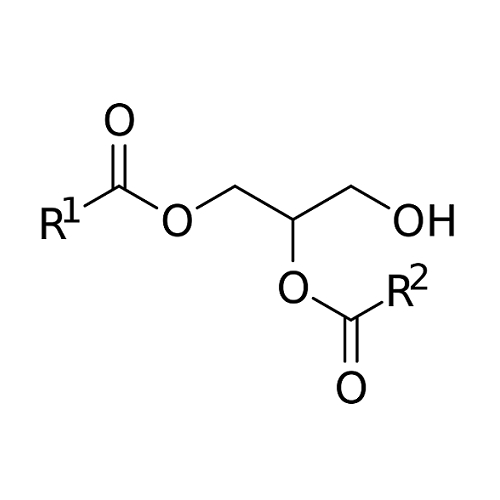
Diacylglycerol
Scientific names: Diacylglycerol, 1,2-diglyceride, 1,3-diglyceride
Alternate names: DAG, Diacilglicerol, Diacylglycérol, Diacylglycerol Oil, Diglyceride, Diglycéride, Huile de Diacylglycérol
Background
Diacylglycerol is a compound found in small amounts in plant oils. Oils rich in diacylglycerol can be made in the lab and used to replace fats in the diet.
Diacylglycerol might work by increasing energy use and the breakdown of fat. Diacylglycerol-concentrated oils taste and look like regular fats and cooking oils.
People use diacylglycerol for obesity, diabetes, high levels of triglycerides in the blood, and other conditions, but there is no good scientific evidence to support most of these uses.
Diacylglycerol might work by increasing energy use and the breakdown of fat. Diacylglycerol-concentrated oils taste and look like regular fats and cooking oils.
People use diacylglycerol for obesity, diabetes, high levels of triglycerides in the blood, and other conditions, but there is no good scientific evidence to support most of these uses.
Safety Safety definitions
When taken by mouth: Diacylglycerol is likely safe for most people. It's usually well tolerated, but might cause some stomach upset similar to other cooking oils.
Special Precautions & Warnings:
Pregnancy and breast-feeding: Diacylglycerol is likely safe when consumed in foods. There isn't enough reliable information to know if diacylglycerol is safe to use in larger amounts when pregnant or breast-feeding. Stay on the safe side and stick to food amounts.Effectiveness
NatMed Pro rates effectiveness based on scientific evidence according to the following scale: Effective, Likely Effective, Possibly Effective, Possibly Ineffective, Likely Ineffective, Ineffective, and Insufficient Evidence to Rate.
Possibly effective Effectiveness definitions
- Obesity. Taking diacylglycerol by mouth seems to improve weight loss in overweight or obese adults.
Dosing & administration
Diacylglycerol is a compound naturally found in small amounts in plant oils. Oils such as soybean and rapeseed can be changed to include higher concentrations of diacylglycerol to be used as replacement cooking oils. It's most often been used by adults in doses of 10-20 grams by mouth daily for up to 1 year. Speak with a healthcare provider to find out what dose might be best for a specific condition.
Interactions with pharmaceuticals
It is not known if Diacylglycerol interacts with any medicines. Before taking Diacylglycerol, talk with your healthcare professional if you take any medications.
Interactions with herbs & supplements
There are no known interactions with herbs and supplements.
Interactions with foods
There are no known interactions with foods.
vital.ly has licensed monographs from TRC Healthcare.
This monograph was last reviewed on 12/04/2024 10:00:00 and last updated on 18/11/2020 03:07:15. Monographs are reviewed and/or updated multiple times per month and at least once per year.
Natural Medicines disclaims any responsibility related to medical consequences of using any medical product. Effort is made to ensure that the information contained in this monograph is accurate at the time it was published. Consumers and medical professionals who consult this monograph are cautioned that any medical or product related decision is the sole responsibility of the consumer and/or the health care professional. A legal License Agreement sets limitations on downloading, storing, or printing content from this Database. No reproduction of this monograph or any content from this Database is permitted without written permission from the publisher. It is unlawful to download, store, or distribute content from this site.




